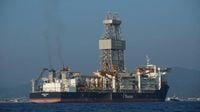In a bold move that has sparked international controversy, former President Donald Trump has signed an executive order aimed at ramping up deep-sea mining operations both within U.S. waters and in international territories. The order, released on April 25, 2025, seeks to position the United States as a global leader in seabed mineral exploration, a sector rich in critical resources such as cobalt and rare earth elements.
The executive order is designed to expedite the issuance of exploration licenses and recovery permits, facilitating a faster pathway for mining companies to access the abundant polymetallic nodules located on the ocean floor. These nodules are estimated to contain billions of tonnes of minerals essential for various industries, including aerospace, green technology, and healthcare.
However, this initiative has drawn sharp criticism from China, which claims that Trump's order "violates" international law. Chinese foreign ministry spokesman Guo Jiakun expressed concerns, stating that the order "harms the overall interests of the international community." This response highlights the delicate balance of international relations surrounding the governance of deep-sea resources, particularly as China currently dominates the global production of rare earths and critical metals.
According to U.S. officials, the motivation behind the order is clear: to enhance America’s competitive edge over China in the underwater resource arena. A U.S. official remarked, "We want the U.S. to get ahead of China in this resource space under the ocean, on the ocean bottom." This sentiment underscores a growing urgency among U.S. policymakers to secure a foothold in a sector that is increasingly viewed as vital for national economic interests.
The administration has projected that deep-sea mining could significantly boost the U.S. economy, estimating a potential increase of $300 billion over the next decade and the creation of approximately 100,000 jobs. Yet, this optimistic outlook is clouded by environmental concerns raised by scientists and conservationists alike.
Jeff Watters, a representative from Ocean Conservancy, voiced strong opposition to deep-sea mining, asserting that it poses severe risks to ocean ecosystems. "Deep-sea mining is a deeply dangerous endeavor for our ocean," he stated, emphasizing that the detrimental effects of such activities extend beyond the ocean floor to impact the entire water column and all marine life dependent on it.
In light of these concerns, several countries, including members of the European Union and the United Kingdom, have advocated for a moratorium on deep-sea mining until further scientific research can adequately assess its environmental impacts. This call for caution reflects a broader apprehension about the long-term consequences of disrupting fragile marine habitats.
One company at the forefront of this burgeoning industry, The Metals Company (TMC), is already in discussions with the U.S. government to secure the necessary permits to commence mining operations. TMC's CEO, Gerard Barron, has expressed optimism about beginning mining by the end of 2025. He argues against the environmental claims made by critics, asserting that the abyssal zone—located between 3,000 and 6,000 meters below sea level—exhibits very low concentrations of life. Barron noted, "Here there's zero flora. And if we measure the amount of fauna [animal life], in the form of biomass, there is around 10g per square meter. That compares with more than 30kg of biomass where the world is pushing more nickel extraction, which is our equatorial rainforests."
Nevertheless, the scientific community remains skeptical. A recent study published by the Natural History Museum and the National Oceanography Centre examined the long-term impacts of deep-sea mining based on tests conducted in the 1970s. The findings suggested that while some sediment-dwelling creatures managed to recolonize affected areas, larger marine animals did not return, likely due to the depletion of essential nodules that take millions of years to form.
This ongoing debate raises critical questions about the balance between economic development and environmental stewardship. As nations navigate the complexities of international law and resource management, the implications of Trump's executive order will likely reverberate far beyond U.S. shores.
In summary, Trump's executive order to expedite deep-sea mining permits has ignited a contentious dialogue about the future of ocean resource exploitation. With China condemning the move as a violation of international law and environmental advocates warning of the potential ecological fallout, the unfolding drama underscores the intricate interplay of geopolitics and environmental ethics in the quest for natural resources.




